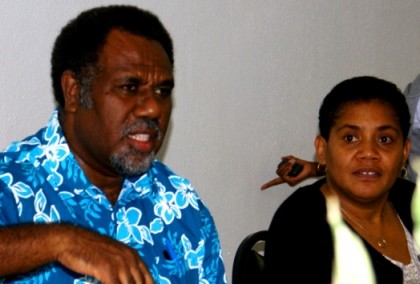
Members of the newly formed Pacific Media Association (PacMA) met this week in Samoa to discuss media freedom issues, which they claim have been ignored by the longstanding Pacific media body PINA .
But the president of the Pacific Islands News Association (PINA) says journalists should focus on “professional development” rather than “politics”.
“PINA should focus on training and developing professional journalists because of the pressing issues facing the Pacific today – climate change, economic development and such. Our media need to be equipped so they can translate these to the people,” Moses Stevens said.
“PINA is not here to change governments.”
Earlier this year, Cook Islands News editor John Woods resigned as vice-president over PINA silence on Fijian media censorship and regulation, as well as issues about organisational transparency.
Spearhead group
Woods has since teamed up with Tonga’s Taimi Media Network CEO Kalafi Moala, Samoa Observer publisher Savea Sano Malifa, Vanuatu Daily Post publisher Marc Neil-Jones and former Fiji Sun publisher – now an editor at the Samoa Observer Russell Hunter, to spearhead a rival news network to serve the region.
The venture has secured funding from the United States.
“It’s about getting back to the basics of putting out timely, quick press statements voicing concerns over media freedom issues,” says founding member Neil-Jones.
In that regard, he says PINA has failed.
“PINA hasn’t stood up for media freedom issues, it was not been doing what it originally was set up to do. They never said anything on Fiji [media censorship], they never said anything on Tonga [proposed media regulations].”
Neil-Jones added that it was “absurd” for the PINA secretariat to remain in Fiji, given the restricted media atmosphere under the military regime. The new PMA will likely be based in Samoa, with state-sponsored media bodies having limited status: “We may have government people but without a vote.”
PINA dialogue
However, Stevens – elected to preside over PINA last year – says the media body has no business challenging political regimes.
“We don’t want the Fiji situation to derail us from what we need to do, which is develop Pacific Islands journalism. Fiji has a military regime – it is not in our capacity to deal with that,” he said.
The veteran Vanuatu broadcaster continued that PINA’s 20 odd members would “make more impact from the inside”.
“There is no use for PINA to wave the banner and beat the dreams on media freedom from the outside. We need to sit down with the Fiji government and educate them and talk about media freedom with that government.”
Stevens calls this the “Pacific way” – the Pacific Islands Forum (PIF) has taken a similar stance of “continued dialogue” with Fiji.
In the days leading up to the PIF meeting last week in Port Vila Vanuatu, PINA ran a two-day media workshop for journalists on forum-related issues such as PACER, climate change, the Pacific Plan and the Millenium Development Goals (MDGs). Speakers included PIF secretary General Tuiloma Neroni Slade, his deputy Feleti Teo, PACER Plus chief trade adviser Dr Chris Noonan, and chief guest Vanuatu Prime Minister and PIF chair Edward Natapei.
The new regional media body PacMA has yet to finalise its headquarters and other organisational and administrative details.



